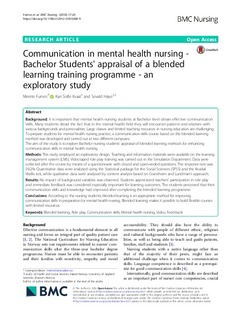| dc.contributor.author | Furnes, Merete | |
| dc.contributor.author | Kvaal, Kari | |
| dc.contributor.author | Høye, Sevald | |
| dc.date.accessioned | 2019-03-08T09:09:54Z | |
| dc.date.available | 2019-03-08T09:09:54Z | |
| dc.date.created | 2018-05-25T10:20:40Z | |
| dc.date.issued | 2018 | |
| dc.identifier.citation | BMC Nursing. 2018, 17 (1), . | |
| dc.identifier.issn | 1472-6955 | |
| dc.identifier.uri | http://hdl.handle.net/11250/2589295 | |
| dc.description | © The Author(s). 2018 Open Access This article is distributed under the terms of the Creative Commons Attribution 4.0 International License (http://creativecommons.org/licenses/by/4.0/), which permits unrestricted use, distribution, and reproduction in any medium, provided you give appropriate credit to the original author(s) and the source, provide a link to the Creative Commons license, and indicate if changes were made. The Creative Commons Public Domain Dedication waiver (http://creativecommons.org/publicdomain/zero/1.0/) applies to the data made available in this article, unless otherwise stated. | |
| dc.description.abstract | Background It is important that mental health nursing students at Bachelor level obtain effective communication skills. Many students dread the fact that in the mental health field they will encounter patients and relatives with various backgrounds and personalities. Large classes and limited teaching resources in nursing education are challenging. To prepare students for mental health nursing practice, a communication skills course based on the blended learning method was developed and carried out at two different campuses. The aim of the study is to explore Bachelor nursing students’ appraisal of blended learning methods for enhancing communication skills in mental health nursing. Methods This study employed an exploratory design. Teaching and information materials were available on the learning management system (LMS). Videotaped role play training was carried out in the Simulation Department. Data were collected after the course by means of a questionnaire with closed and open-ended questions. The response rate was 59.2%. Quantitative data were analysed using the Statistical package for the Social Sciences (SPSS) and the Kruskal Wallis test, while qualitative data were analysed by content analysis based on Graneheim and Lundman’s approach. Results No impact of background variables was observed. Students appreciated teachers’ participation in role play and immediate feedback was considered especially important for learning outcomes. The students perceived that their communication skills and knowledge had improved after completing the blended learning programme. Conclusions According to the nursing students, blended learning is an appropriate method for improving communication skills in preparation for mental health nursing. Blended learning makes it possible to build flexible courses with limited resources. | |
| dc.description.abstract | Communication in mental health nursing - Bachelor Students' appraisal of a blended learning training programme - An exploratory study | |
| dc.language.iso | eng | |
| dc.title | Communication in mental health nursing - Bachelor Students' appraisal of a blended learning training programme - An exploratory study | |
| dc.type | Peer reviewed | |
| dc.type | Journal article | |
| dc.description.version | publishedVersion | |
| dc.source.pagenumber | 10 | |
| dc.source.volume | 17 | |
| dc.source.journal | BMC Nursing | |
| dc.source.issue | 1 | |
| dc.identifier.doi | 10.1186/s12912-018-0288-9 | |
| dc.identifier.cristin | 1586668 | |
| cristin.unitcode | 209,4,2,0 | |
| cristin.unitcode | 209,4,1,0 | |
| cristin.unitname | Institutt for helsefag | |
| cristin.unitname | Institutt for sykepleiefag | |
| cristin.ispublished | true | |
| cristin.fulltext | original | |
| cristin.qualitycode | 1 | |
